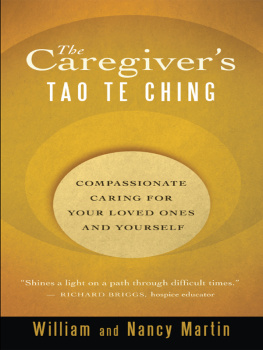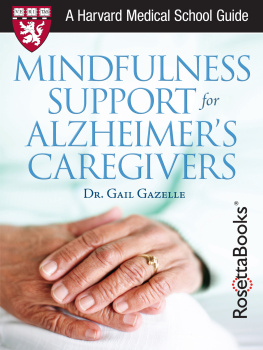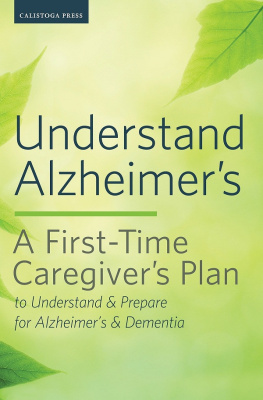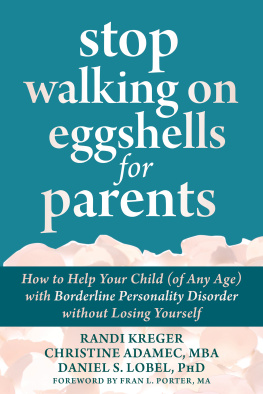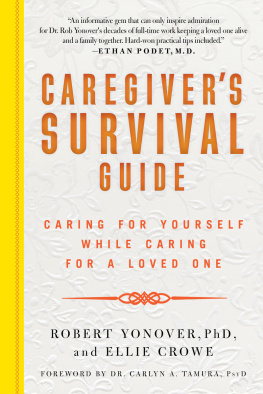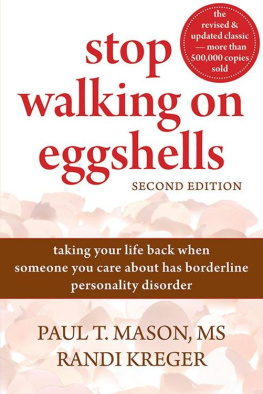Walking on Eggshells
Walking on Eggshells
Caring for a Critically Ill Loved One
By
Amy Sales, MSW, LCSW-C
New Horizon Press
Far Hills, NJ
Copyright 2012 by Amy Sales
All rights reserved. No portion of this book may be reproduced or transmitted in any form whatsoever, including electronic, mechanical or any information storage or retrieval system, except as may be expressly permitted in the 1976 Copyright Act or in writing from the publisher.
Requests for permission should be addressed to:
New Horizon Press
P.O. Box 669
Far Hills, NJ 07931
Sales, Amy
Walking on Eggshells: Caring for a Critically Ill Loved One
Cover design: Robert Aulicino
Interior design: Susan Sanderson
Library of Congress Control Number: 2011928842
ISBN: 978-0-8828-2409-3
New Horizon Press
Manufactured in the U.S.A.
16
TO
Nikki, who held my hand along the way
and unconditionally loved me
through the highs and lows of this process;
my beautiful daughter, Madison, who teaches me every day
that you can never love a child too much;
and to my family and friends for all of their endless support.
Authors Note
This book is based on the authors research, personal and work experiences and clients real-life experiences. Unless permissions were granted, the names and identifying characteristics of the cases and people in this book have been altered to ensure confidentiality. Only the names of contributing experts remain.
For purposes of simplifying usage, the pronouns he/she and him/her are sometimes used interchangeably. The information contained herein is not meant to be a substitute for professional evaluation and therapy with mental health professionals.
Contents
A ll too often it is not until we face a loved ones critical illness, truly a life-altering event, that we reflect on and do a mental inventory of our relationship with him or her. The fact that you are reading this book may indicate that you are experiencing such an event right now. It is natural to feel frightened and perhaps overwhelmed by arduous and daunting tasks and the needs of your loved one as you both face this difficult and emotional time.
This book is intended for you, the caregiver. The caregiver plays a unique and vital role for a loved one who has a life-threatening disease. It is my hope that as you read you will find comfort, helpful guidelines and a sense of direction for the uncharted journey that you are about to take.
The information and advice in this book will let you know that you are not alone in your day-to-day role as the silent hero and allow you to look back later with a feeling of peace and lack of regret.
I have been providing counseling on the emotional aspects of terminal illnesses and grief to patients and their caregivers for more than twenty years. I have come to understand the significance of making the most out of each day and not to put off for tomorrow what can be done today. I am blessed to be employed in a profession that reminds me each day that life is too short and to appreciate the gifts lying in front of me, no matter how big or small.
In my counseling, I have met with many individuals who have taken a lifetime to connect with these gifts. Unfortunately, I have also encountered others who were never able to do this.
It is common to struggle with what to do or say when your loved one is facing a life-threatening disease. Many people feel as though they are walking on eggshells. I have witnessed many missed opportunities to reach out and show support to those who are very ill due to the fear of saying the wrong words or the inability to find words at all.
Throughout this book I will provide useful advice, strategies, information and examples in order to make reaching out to a terminally ill loved one less frightening. I know from long experience that you will become aware of many instances throughout this journey when the eggshells of difficult experiences are present and how hard it can be to make your way forward when they occur on the path you must navigate.
I will share what I have experienced as common themes and problems that patients, families and caregivers encounter. Taking on the role of caregiver does not come with a set of instructions. Rather, it is based on love and commitment. Be gentle with yourself as you read onward and as you embark on this arduous journey.
L ife will not be the same as you and your family knew it prior to receiving the diagnosis of a life-threatening illness. Your first role as caregiver and support system is to be aware that your loved one will experience a range of emotions. You may, at times, find that your own feelings will change in tandem with his or hers. At other times, the two of you may be in very different places emotionally.
Your job is to be tuned in to the ill persons emotions and to recognize when to reach out and help calm or ground him or her. From this point forward, you must expect the unexpected.
Nobody ever knows how he or she will respond when given a life-threatening illness diagnosis. Shock and disbelief are feelings many experience. Here are a few typical reactions I have seen in the patients whom I and other caregivers have encountered:
This cant be right.
I must be in a bad dream.
No, this is not happening to me.
When the majority of people receive diagnoses of life-threatening illnesses, they become instantly frightened and assume their diagnoses mean death. It is not until the patients discuss the diagnoses with their physicians and hear treatment options with clear plans of action that they can take a deep breath and feel a sense of hope.
When I meet with a patient, I explain to him or her that he or she is on the roller coaster of his or her life. There will be highs, lows and in-betweens. The ride may change from minute to minute and is not predictable. But I assure the patient, just as you will as a caregiver, that he or she will not be on the ride alone.
Patients and their caregivers share a common condition from the minute the diagnosis is received: immense loss of control. I cannot think of a greater feeling of loss of control for both parties. Patients would do anything to protect their loved ones from having to imagine life without them and caregivers would do anything to make their loved ones well.
Many of us feel we have to be in control of our lives, family, relationships and health at all times. The ultimate feeling of loss of control comes when we face our own mortality. Imagine the anxiety that your loved one must be experiencing at this time. It is important to understand that many patients lose their sense of identity while fighting for their lives. Many are not able to work, provide for their families, take care of their loved ones or perform their daily routines independently. These are experiences which take away all the confidence we have learned to value in building our lives.
Next page


